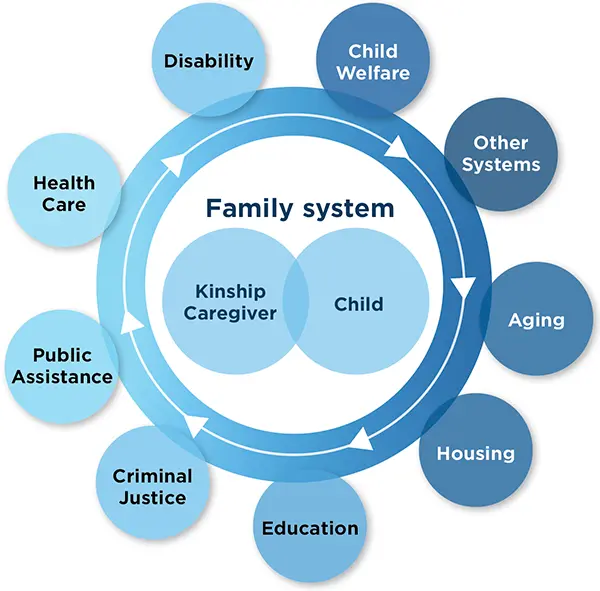
To Support Kinship Caregivers, Systems Serving Children and Families Must Collaborate on Delivering Services
In 2022, more than 2.5 million children were being raised in kinship care (i.e., by a grandparent, other relative, or close family friend). While children whose parents are unable to care for them do better when cared for by kin than by non-kin, the additional responsibility and changing family relationships can create challenges for kinship caregivers that may threaten their health and restrict their ability to provide optimal care to their relative children. However, when systems work together to provide supports (see Figure), kinship caregivers can provide safe, stable, and loving homes to the children in their care. This blog describes challenges faced by kinship caregivers and their children and offers suggestions for how systems can work together to provide a safety net.
A variety of systems must collaborate to best serve children and caregivers

Most kinship placements are informal arrangements, situations in which the child’s care is not overseen by a county or state child welfare agency and the families receive little to no formal financial or other supports (as opposed to formal arrangements, where the child is in state custody and placed in kinship foster care). Kinship caregivers typically do not expect to be the primary caregiver for the child and do not plan for such an arrangement, whether financially or emotionally. Many kinship caregivers are grandparents, more than half of whom are still employed and need child care (more than one third of children in kinship care are under age 6). About one quarter of caregivers have a disability, and about half are ages 60 and older and may need physical or mental health services. Caregivers are more likely than other families to have incomes below the federal poverty level, may live in small dwellings that become crowded when children move in, or in senior housing that is strictly intended for senior residents, and may lack financial resources to relocate.
Furthermore, the children whom kinship caregivers support have often been exposed to trauma and need special attention, including special education assistance and mental health services. Kinship caregivers often do not know about—or have difficulty finding—services these children may need, including help enrolling in school, advocacy for individualized education plans, or help securing necessary medical services.
Despite their clear needs, finding support to overcome challenges can confuse and overwhelm many kinship caregivers. Kinship caregivers and their children benefit when the systems designed to meet their needs collaborate to offer easily accessible and readily available services. There are existing examples of such collaborations, and many more are possible. These positive examples include the following:
- Intergenerational housing: Child Trends is evaluating Bridge Meadows, an intergenerational housing community that aims to provide permanent housing for children and families who have been impacted by the child welfare system, including many kinship care families.
- Kinship navigation: Increasingly, states are developing kinship navigator programs designed to link caregivers with supports and services in multiple domains. Child Trends is currently evaluating kinship navigator programs in California (Wayfinder Family Services) and South Carolina (Charleston HALOS).
- Supports for older kinship caregivers: Given the population of elderly caregivers, USAging offers comprehensive supports and services to older adults, including information and referral/assistance, case management, meals, in-home services, transportation, and health and wellness programs.
- Educational supports: Education challenges can be addressed via Community Schools, which support the child and family through partnerships with community providers to address problems such as hunger, illness, and mental and physical health.
- General resources and supports: Family Resource Centers can offer a centralized location for kinship caregivers to drop in and find resources and referrals to needed services in a welcoming and supportive environment. Nationally, the Grandfamilies & Kinship Support Network offers resources and technical assistance to systems wanting to enhance their kinship care support networks.
Related Research
- Positive Self-Care Practices Can Reduce Black Kinship Caregivers’ Stress
- Kinship Care Supports the Academic Performance of Children
- Child Trends Comments on Proposed Rule to Develop Separate Licensing Standards for Relative or Kinship Foster Homes
- Variations in the use of kinship diversion among child welfare agencies: Early Answers to Important Questions
- Does Your Child Welfare Agency Divert Children to Kin? Guide to using the Kinship Diversion Estimation Tool
Suggested citation
Rushovich, B., Sun, S., McBride, C., Malm, K., & Washington, T. (2024). To support kinship caregivers, systems serving children and families must collaborate on delivering services. Child Trends. DOI: 10.56417/9806y446x
© Copyright 2024 ChildTrendsPrivacy Statement
Newsletter SignupLinkedInThreadsYouTube